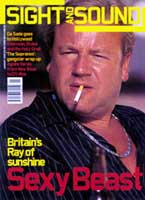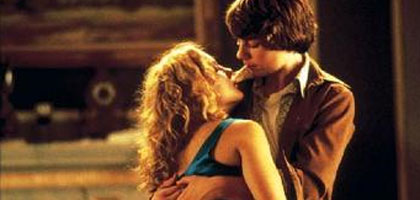
Some like it sweet
Film of the Month: Almost Famous

Almost Famous gets the music right, but show me the sex and drugs, says John Wrathall
It's been four years since Cameron Crowe's last - and best - film Jerry Maguire. But during that period he hasn't been idle: returning to his journalistic roots, he found time to put together a 370-page book of interviews with Billy Wilder. Like Truffaut's famous book on Hitchcock, Conversations with Wilder (1999) offers the curious spectacle of an almost painfully sensitive and humane fan bowing down before a film-maker with a much darker, more bitter sensibility. Perhaps critics who become film-makers are destined to admire the qualities which they themselves lack. For one can't help noticing that Wilder's key virtues - cynicism, satirical bite, economy - are precisely those missing from Crowe's new film Almost Famous.
However, Crowe's worship of Wilder is still very relevant to a film that both addresses and embodies the idea of fandom. Loosely based on Crowe's own precocious teenage years - he was a contributor to rock magazine Rolling Stone at 16 - Almost Famous follows 15-year-old journalist William Miller (Patrick Fugit) on tour with the fictional band Stillwater. Just as William is thrilled to fraternise with Stillwater's cool lead guitarist Russell Hammond (Billy Crudup), so for Crowe the film provided an opportunity to hang out with his idols. At 16, Crowe wrote the sleevenotes for Peter Frampton's hit album Frampton Comes Alive! A quarter of a century later, Frampton returned the favour: credited as a technical consultant, he was responsible for training Crudup and his fellow band members and also has a cameo as the manager of one of his own bands, Humble Pie. It's tempting to imagine a sequel to Almost Famous in which the grown-up, successful William is able to throw some gainful employment the way of the now rather overlooked Russell.
Like Crowe himself, William feels the need for a mentor. (One of the more interesting revelations in Conversations with Wilder is that Crowe first approached his idol to ask him to appear in Jerry Maguire as veteran sports agent Dicky Fox, whose aphorisms inspire Jerry. Wilder turned down the role, but their meeting led to the interview project.) In Almost Famous, the mentor figure is the legendary, real-life rock journalist Lester Bangs, impersonated here by the unstoppably versatile Philip Seymour Hoffman. Bangs' crucial advice to William, delivered at two separate turning points in the film, is that his writing must be "honest and unmerciful". But this ideal is hard to live up to in the real world. Just as Jerry Maguire lost his job for displaying too much integrity in his mission statement, so William finds his warts-and-all profile of Stillwater spiked by Rolling Stone when the band refuses to confirm his unflatteringly truthful reporting.
I haven't read Crowe's music journalism, but on the strength of Almost Famous (and Conversations with Wilder, for that matter), "unmerciful" isn't the first word that springs to mind. And his view of the rock scene circa 1973 seems a lot stronger on nostalgia than on honesty. Certainly, anyone who's seen Robert Frank's suppressed documentary Cocksucker Blues, which followed the Rolling Stones on a 1972 US tour, will be surprised by the comparative benignity of Crowe's version. Apart from one scene straight out of This Is Spinal Tap, where Russell and Stillwater's jealous lead singer Jeff Bebe (Jason Lee) argue about their relative positions on the band's new t-shirt, these rock stars are remarkably unegotistical and well behaved. The sex is all safely behind closed doors - with William waiting patiently outside in the hotel corridor. Russell does drop acid at a party, but the scene is played for laughs. Otherwise the drug references are limited to a tiresome running joke in which William's mother (Frances McDormand), who is paranoid that he's taking drugs, overhears people talking about pot every time she rings him up.
Of course, launching a 15-year-old protagonist into a full-on orgy of sex and drugs would inevitably court controversy (not to mention an 18 certificate), and controversy isn't Crowe's bag. From his days as a boy journalist Crowe certainly has plenty of first-hand experience of the world he depicts; maybe he really is trying to tell us that the truth was much less extreme than the legend. But that's hardly a thrilling premise for a rock 'n' roll movie. Besides, even in purely narrative terms, Crowe has a tendency to fudge the issues. On the road William shares his hotel room with the "band-aids", a group of teenage camp followers who class themselves a cut above mere groupies. One day they announce they're going to deflower him: cue a dreamy, slow-motion montage in which three of the band-aids undress him while Penny Lane (Kate Hudson) - the girl with whom he's actually in love - looks on with amused detachment. It's a highly charged moment - until Crowe fades to black. Next morning the band-aids' dialogue indicates that William is still a virgin; later, in New York, an enigmatic look between William and Russell suggests that he may not be after all. In the era of American Pie, it's bewildering to find a coming-of-age movie that's so coy about the physical part of the process.
This isn't the only issue Crowe raises, only to shy away from. At the start of the film Bangs warns William that rock 'n' roll is over, and the subsequent arrival of a corporate smoothie who takes over Stillwater's management (and nearly gets them killed when he makes them give up their trusty tour bus for a plane) seems to confirm his doom-laden predictions. But in the film's closing montage we see Stillwater (still together, despite the rifts of the previous tour) setting off on their 1974 tour, which makes you think 1973 wasn't the end of an era after all.
Always a fluent writer of dialogue, Crowe puts some rip-roaring tirades in Bangs' mouth, delivered with verve by Hoffman. When, near the end of the film, William is stuck writing his Stillwater profile, Bangs reproaches him for getting too close to the musicians, letting them make him feel cool. The point, Bangs insists, is that people like him and William aren't cool; great art, he continues, is not made by cool people - "great art is about guilt and longing." An interesting idea, but once again Crowe saddles himself with a manifesto he can't live up to.
Despite personable performances from Billy Crudup, Kate Hudson and newcomer Patrick Fugit, these characters have none of the passion and incipient mania that made Jerry Maguire - or John Cusack's Lloyd Dobler in Crowe's debut Say Anything - so engaging. At one point William gets angry when Penny describes him as "sweet". But all the characters here are sweet, not least the self-destructive Penny. Crowe's refusal to call a groupie a groupie (the distinction is that band-aids only give blow-jobs) is symptomatic of a very unBangsian excess of mercy towards his characters. Even Crowe's most overtly ironic, Wilderesque touch - setting the scene in which Penny has her stomach pumped after an overdose to Stevie Wonder's sickly-sweet 'My Cherie Amour' - backfires, making a traumatic event seem inconsequential. And sure enough, Penny is last seen heading for Morocco, happy, smiling and unscarred by her ordeal. In this rock 'n' roll circus there are, it seems, no casualties.
